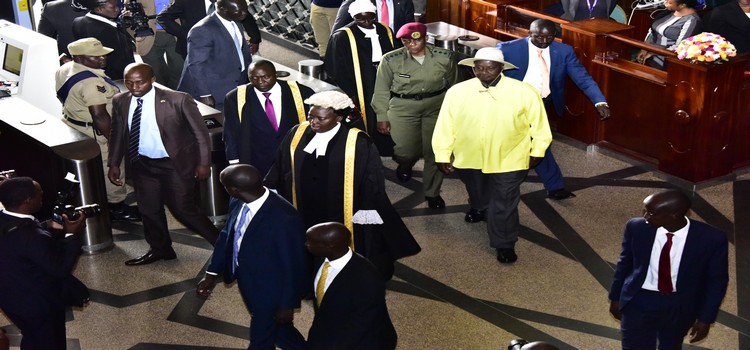Museveni outlines strategy to end insecurity

President Museveni has warned criminals of imminent defeat, saying the country has long acquired capacity to suppress criminal activity.
Museveni addressed Parliament Wednesday, 20 June 2018, on government’s strategy to defeat rising cases of murders and kidnaps following the assassination of Arua Municipality MP Ibrahim Abiriga early this month.
“Those who are doing bad things have endangered themselves; we shall crush them,” said Museveni, who chronicled the country’s long history of insecurity, which he said ended with the defeat of the Allied Democratic Forces (ADF) rebel outfit and the Lord’s Resistance Army (LRA) in 2007.
The President addressed Parliament following his request made during the presentation of the national Budget for the Financial Year 2018/2019 last week. Article 101(2) of the Constitution permits the President to make occasional address to Parliament on any matter of national interest, in consultation with the Speaker.
President Museveni said Uganda is now peaceful for the first time in 500 years, and that the pockets of urban criminality will be defeated.
9 point strategy
Museveni rolled out a nine point strategy which he said will be employed by government in defeating crime.
This includes fingerprinting all legal guns in the country, a strategy he said the Police have the technical capacity to effect.
“I have now issued an order that all guns must be fingerprinted,” said Museveni.
All motorcycles and cars are to acquire electronic number plates “to be installed at the cost of the owner,” which he said will enable Police track down owners of cars discovered at crime scenes.
Police, said Museveni, have also banned wearing of hooded jackets by cyclists, an instruction he issued during the funeral of slain MP Abiriga in Arua.
Helmets are to be maintained, but this time with illuminated numbers both on the front and back, to enable the tracking of criminals.
The National Social Security Fund (NSSF) and National Enterprises Cooperation (NEC), the manufacturing arm of the UPDF, to undertake manufacturing of the helmets and electronic number plates.
Museveni has also promised to modernize the Government Analytical Laboratory (GAL) to create a DNA bank to aid in scientific resolution of crime.
The President instructed Internal Affairs Minister Gen Jeje Odongo to brief Parliament on the capacity of the Police canine section, which was expanded during the reign of then IGP Kale Kayihura.
He warned Ugandans against breaching crime scenes, which disrupts the detection of criminals by dogs and interferes with forensics.
To ensure the instantaneous reach of security officers at crime scenes, Museveni said he has instructed the Police to revive the disbanded Flying Squad, previously headed by the now incarcerated Herbert Muhangi.
Drones, technically known as Unmanned Air Vehicles (UAV), are to be used in tracking down criminals on the move as Police officers approach.
Social media is to be brought under tight scrutiny, with Museveni vowing to identify and arrest hatemongers who he said are abusing the platforms. He however, ruled out shutting down social media, instead rooting for a surgical approach to target only suspects.
Specialised equipment will be acquired to aid the Uganda Revenue Authority and customs officials to detect weapons concealed in imports.
Museveni said incompetence and double agency by some security officers contributed to the wave of insecurity, which he vowed to stop.
“Negligence and even collusion with the criminals by some elements in the security services were some of the problems…” said Museveni.
The President remained tightlipped on the arrest of former Inspector General of Police Kale Kayihura and a host of other officials said to have been his close associates when he served as the country’s top cop.
State owned newspaper, the New Vision, in a recent publication, linked Kayihura’s arrest to the murder of former Assistant Inspector General of Police Andrew Felix Kaweesi and the illegal extradition of several renegade security officers from neighboring Rwanda.
At the height of killings and murders, Museveni sacked Gen Kayihura and then Security Minister Lt Gen Henry Tumukunde, replacing the duo with John Martins OkothOchola and Gen Elly Tumwine respectively.
Museveni also agreed to host MPs next Tuesday,26 June 2018 for an interactive session on the state of national security.
This followed a request by the Speaker of Parliament Rebecca Kadaga to have the discussion, which could not be held in the House as it was inhibited by the Parliament Rules of Procedure.
